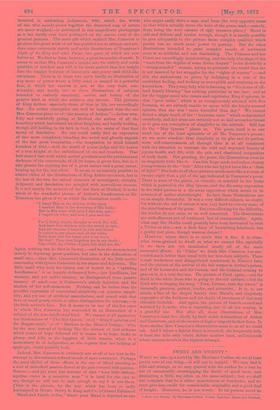SWEET AND TWENTY.*
WREN we take up a novel by Mr. Mortimer Collins, we are at least pretty sure of one thing,—it will not be insipid. We may find it wild and strange, or we may quarrel with the author for a way he has of occasionally overstepping the limits of good taste, and descanting a little too often on the same subject ; but we shall not complain that he is either monotonous or wearisome, and we must give him credit for considerable originality and a good deal of insight. Moreover, he is not wordy. In his present novel he
• Sweet and Twenty. By Mortimer Collins. 3 vole. London: Hurst and Bisekett
has avoided those two faults from which he cannot always be ac- quitted, and writes in his best manner. Nothing can be better, for instance, than his picture of the Carr family, or his descrip- tions of the little old lady of the manor, and that brave soldier, Sir Hugh Luttrel ; while the two very dissimilar girls who seem to have an equal right to the title of heroine, notwith- standing that Fay is the real "Sweet and Twenty," are drawn with skill, and are both pleasing, because natural characters. Fay is particularly bewitching ; if we take exception to anything about her, it must be to her extraordinary passion for climbing. At every crisis of her fate this damsel is literally "up a tree," and it is rather absurd to see her enamoured swains climbing after her into her "sky parlour" in the old cedar, although she herself is very much at home there. With all her wildness, Fay is very well able to take care of herself, and has very definite ideas on the subject of matrimony. She has no pride, in the evil sense, yet no one could be more alive to the exigencies of social position than is this young lady. This is her ultimatum at seventeen :— " When I marry, I must marry a man, not merely something in the City. I could marry a poet, or a soldier, or a Member of Parliament, if he were honest, or a parson, if he really believed in Christ ; but to marry a man who buys and sells, whether it's wholesale or retail, seems to me dreadful."
Now, as Fay has Sir Hugh for a father, and has been brought up from her eleventh year by that pearl of old ladies, Mistress Hannah Litton, it is quite natural that she should be honest, frank, and unconventional ; and her Indian birth and her brilliant French mother sufficiently account for a precocity which is never strained or out of character, but which adds a quaintness and piquancy to the character of this charming little maiden. The man she does eventually marry is quite worthy of her, although few men in the position of Sir Hugh Luttrel would give an only daughter and great heiress to one who had not only risen from the ranks, but whose parents occupied so humble a station in his own close vicinity. Mr. Collins, however, guards against any thought of this kind, by hinting that old Carr undoubtedly had gentle blood in his veins, and therefore when his sons, by their own merit and industry, were able to take their places in a sphere to which they had not been born, they behaved as true gentlemen, and not as "snobs." Throughout the book we constantly find the aristocratic and democratic element side by side, jostling each other and mingling together, as in real life. Price Roden—Sir Price, as he afterwards becomes—is one of those great ironmasters who have risen by sheer force of genius and resolution to be a power in the world, or at all events, to wield immense influence over large masses of people. Irontown has arisen at his bidding, and arisen close to the secluded and exclusive little borough of Westbury, where the Littons had for ages ruled supreme as lords of the manor. Miss Litton believes in the Church of England, thinks Free-trade a blunder, holds with a thousand notions which to Price Roden and his son Paul are but antiquated delusions, and does not appreciate the invasion of cinder mountains and smoky chimneys into a peaceful, smiling country. However, she can admire honesty and perseverance, and cannot refuse honour to whom honour is due, so she ends by being quite cordial to Sir
Price, having for a long time been the friend of his son, who is a much less estimable personage. The contrast between the grandeur of Roden Hall and the artistic elegance of Westbury Place is very good ; each habitation exactly befits its inmates ; and when Reginald Litton "made a quaint quadrangle of rooms round a central patio, which he roofed with glass and filled with rare plants ; ran up irregular turrets, and put odd-shaped rooms in unexpected corners, and played all sorts of arabesque freaks," what could be the result but that he should provide it with a fairy mistress ? And such was his daughter, the lady of the manor :—
"Every inch of her, and there were not many inches, seemed to support that dignity. She had calm, grey eyes and a smiling little mouth, unchanged by ago from what it was when boys thought it only too kissable ; and a hand soft and plump, and a figure like a girl's, and a voice like Cardona's. She wore unusual colours in her dross, her favourite being grass-green, with falbalas the colour of dying rose- leaves. She sprinkled herself with diamonds here and there, and carried a long ivory fan, and looked altogether like a good fairy."
Round this old lady, who is as good as she is pleasant, cluster most of the interests of the tale ; but yet, as a picture, the Carr family bear away the palm. Formerly overseer at Irontown, Fiddler Carr, as he is called, lives in a cottage upon the common, With his wife and two sons, the latter having been well educated in the Irontown schools. Mrs. Carr, formerly Mrs. Roden's waiting-maid, is a shrewd, clever, managing woman, thoroughly good at heart, but gifted with a flow of words which were the
expression of what she herself designated as "spirit," but which other people called "temper." "A woman who can't scold," says Mr. Collins, "is never of much use. I like a woman with a temper. Its existence shows that she loves her husband and children," and Mrs. Carr undoubtedly loved hers. But whereas she could always give vocal expression to her sen- timents, her musical husband seldom spoke but through his violin,—and of this instrument, a real Stradivarius, the gift of Price Roden, he was fully master; and wherever we meet with the old man, either iu joyful strains, soft, sympathetic melodies, wailing, long-drawn sounds, or short, questioning notes, his beloved and unfailing companion keeps up an accompaniment to passing scenes. The boys, unlike, yet strongly attached to each other, are of course the pride of their parents. John, with his taste for mathematics and mechanics, naturally distinguishes himself at the iron works ; and Bob, great at cricket and foot-ball, a fearless rider, and devoted to athletic sports, is as evidently cut out for a soldier ; and yet but for the fact of both brothers being attached to the same village beauty, such a consummation would never have been reached. Sarah Daw's coquetry and vulgar ambition are, in fact, the cause of good instead of evil to all save herself. Mr. Collins has expended a good deal of description upon this little servant, on account of the influence which even so silly and vain a little creature is. capable of exerting over men ; for her own sake, she certainly ia not worth it, and it is no wonder that she excites the wrath of Mrs. Carr, who says to her son that if he can resist a pink and white face, she is the mother of a wiser man than Solomon. Her lamentation to Edith about " those creatures in petticoats" might be uttered still more feelingly at this moment, only instead of saying that" they'd learn the planner if they might," we should have to say that they actually do perform that feat, and that the stylish bonnets are not only desired, but possessed. Certain it is that people are none the happier since the pride which they once took in keeping true to their own station in life has become obsolete, and work of most kinds is looked upon as a degradation rather than as honourable employment.
Old Carr, who has lived to see one of his sons Sir Price Roden's partner, and the other a major in a crack cavalry regi- ment, and both unspoilt, is supremely happy ; and it is a pretty picture to see these young men at the dear old cottage again, enjoying their game of quoits, and the old-fashioned, homely supper, and listening to the Stradivarius, as in the days before their greatness. The old fiddler does not often make a speech, but he one day thus addresses his sons :— "I'm an oldish man, boys, and I've done nothing particular in the world except play a few tunes, and catch a few fish, and love my old woman, and bring up you two youngsters to do bettor far than your father. And I'm thankful for you, lads, and so is the mother. We've prayed for you, many's the time ; and no man shall persuade me prayer isn't answered. You're both doing well, but you both ought to marry. No man has done his duty till he marries. What should I be without your mother ? They joke about it, lads, and call a wife a man's bettor half,—but it's true, and no joke. Women are bettor than men, and when a man marries he gets better. Now, it's quite time you thought about it, boys, so listen to what I say."
Not bad advice, if all the wives were as true-hearted as the sharp- tongued Betty Carr. There is, however, one thing which is very- pleasing in this love-story,—it is essentially pure ; and that is a pretty strong recommendation, in a day when even feminine writers too often choose to dilate upon what is evil. When watching the weakness of Paul Roden, in which the effect of his father's training, or rather the lack of it, is ably shown, we are not required to follow him into any scenes of vice ; and in taking leave of characters which have occupied our attention for so long a time, we feel that we can to do so in Christian charity with them all.



































 Previous page
Previous page